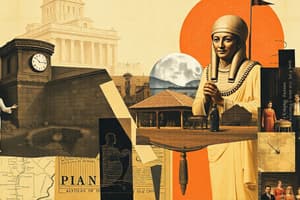Podcast
Questions and Answers
Which ancient civilization was known for constructing fortresses and temples with precious materials?
Which ancient civilization was known for constructing fortresses and temples with precious materials?
- Babylonian
- Egyptian
- Greek
- Assyrian (correct)
Which region was considered the cradle of civilization with records dating back to the end of the fourth millennium BCE?
Which region was considered the cradle of civilization with records dating back to the end of the fourth millennium BCE?
- Babylon (correct)
- Assyria
- Nineveh
- Ashur
Where were the most prominent centers for scholars in various fields supported by the Assyrian kings?
Where were the most prominent centers for scholars in various fields supported by the Assyrian kings?
- Athens
- Nineveh (correct)
- Babylon
- Rome
Which king sent scholars throughout Babylon to collect and preserve ancient literary works?
Which king sent scholars throughout Babylon to collect and preserve ancient literary works?
What script were the clay tablets in Ashurbanipal's library inscribed with?
What script were the clay tablets in Ashurbanipal's library inscribed with?
When was the Assyrian library in Ashurbanipal lost?
When was the Assyrian library in Ashurbanipal lost?
When was the ancient Assyrian Empire established?
When was the ancient Assyrian Empire established?
What was the City of Ashur known for?
What was the City of Ashur known for?
What led to the loss of much of the Assyrian territory in the second century BCE?
What led to the loss of much of the Assyrian territory in the second century BCE?
What were Assyrian military tactics known for?
What were Assyrian military tactics known for?
What transformation did Ashur undergo under Ashur-obalit?
What transformation did Ashur undergo under Ashur-obalit?
What was culturally significant about Ashur?
What was culturally significant about Ashur?
Flashcards are hidden until you start studying
Study Notes
- Rana Al-Mahameed and Hussain Laghabi lived before the sun rose over the British Empire.
- The ancient Assyrian Empire, considered the first real empire, was established around 1300 BCE.
- Assyrian innovations laid the foundation for all major powers.
- Assyrian empire extended across Iraq, Syria, Lebanon, Israel, Turkey, Iran, and Egypt.
- City of Ashur was a trading center for tin and textiles along the Tigris River.
- Ashur culturally significant city with extensive libraries and botanical and zoological gardens.
- Ashur civilization began centuries before the Bronze Age, becoming a major power in the region.
- Ashur was a center for administrative and religious elites where politics and religion were intertwined.
- In 1300 BCE, Ashur-obalit, a high priest, began military campaigns, transforming Ashur from a city to a regional power.
- For the next 150 years, Ashur continued to expand and flourish.
- In the second century BCE, a catastrophic event led to the loss of much of the Assyrian territory.
- For centuries, the Assyrian kings continued their military campaigns, eventually evolving into a lasting imperial system.
- Assyrian military tactics included fortified roads and harsh punishments for enemies.
- Assyrian expansion led to the relocation of indigenous populations to meet various needs.
- Whenever a new ruler took power, a new capital city was built.
- With each new campaign, new fortresses and temples were constructed and decorated with precious materials.
- Despite their reputation as conquerors, the Assyrian kings were also patrons of culture, particularly in Babylon.
- Babylon, a distinct cultural region, was the cradle of civilization, with records dating back to the end of the fourth millennium BCE.
- Ashur was the heir and protector of this rich cultural heritage.
- Assyrian kings supported scholars in various fields from medicine to magic, with the most prominent centers in Nineveh and its gardens of various plants and animals from all over the empire.
- One of the last Assyrian kings, Ashurbanipal, sent scholars throughout Babylon to collect and preserve ancient literary works.
- Assyrian library in Ashurbanipal was filled with clay tablets inscribed with cuneiform script for Akkadian and Sumero-Akkadian languages.
- The library was lost during the sack of Nineveh in 612 BCE.
- However, discoveries in the eighth to ninth centuries CE revealed many ancient literary works, including the epic of Gilgamesh and the Babylonian Talmud.
- The Assyrian Empire lasted for over a thousand years, leaving a lasting impact on the region and the world.
Studying That Suits You
Use AI to generate personalized quizzes and flashcards to suit your learning preferences.




